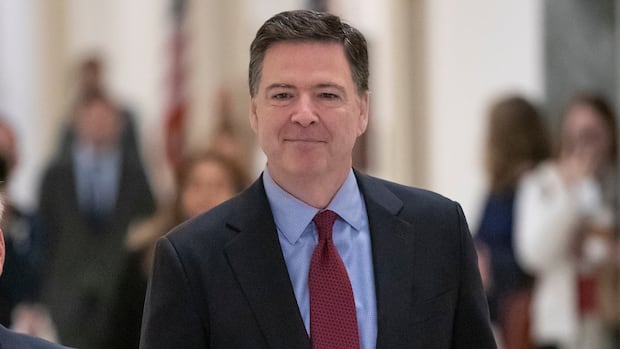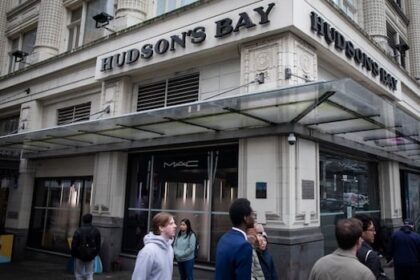WorldA U.S. judge found on Monday there is evidence of misconduct in how a federal prosecutor closely aligned with President Donald Trump secured criminal charges against James Comey. He also ordered that grand jury materials be turned over to the former FBI chief’s defence lawyers.Judge also says Trump-appointed prosecutor may have made significant legal errors in case to grand juryThomson Reuters · Posted: Nov 17, 2025 4:22 PM EST | Last Updated: 2 hours agoListen to this articleEstimated 4 minutesThe audio version of this article is generated by text-to-speech, a technology based on artificial intelligence.A judge found Monday that there is evidence of misconduct in how criminal charges were brought against former FBI director James Comey, seen here in 2018. (J. Scott Applewhite/The Associated Press)A U.S. judge found on Monday there is evidence of misconduct in how a federal prosecutor closely aligned with President Donald Trump secured criminal charges against James Comey, and ordered that grand jury materials be turned over to the former FBI chief’s defence lawyers.Alexandria, Va.-based U.S. Magistrate Judge William Fitzpatrick found that Lindsey Halligan, the Trump-appointed U.S. attorney leading the case, may have made significant legal errors in presenting evidence and instructing grand jurors who were weighing whether to charge Comey — mistakes that could have tainted the case.”The record points to a disturbing pattern of profound investigative missteps, missteps that led an FBI agent and a prosecutor to potentially undermine the integrity of the grand jury proceeding,” Fitzpatrick wrote in his ruling. Comey is one of three prominent critics of the Republican president to have been hit with criminal charges by Trump’s Justice Department in recent months. Trump critics have described the charges as a part of a campaign by the president to chill opposition. Comey pleaded not guilty after being charged in September with making false statements and obstructing a congressional investigation.WATCH | Why Trump targeted Comey:How a former FBI director ended up on Trump’s enemy listIn an apparent escalation of U.S. President Donald Trump’s attacks on his political enemies, former FBI director James Comey has now been indicted on criminal charges. For The National, CBC’s Lyndsay Duncombe lays out a timeline of how it got to this point. A different judge previously expressed skepticism about the legality of Halligan’s appointment, while other courts have raised alarm about political motivations in Justice Department investigations. Grand juries have rejected cases tied to Trump’s police surge in Washington.Halligan had not worked as a prosecutor before Trump appointed her in September. She had primarily practised real estate law and represented Trump in civil litigation.A Justice Department spokesperson declined to comment on the judge’s decision. Prosecutors quickly sought to pause the order to turn over grand jury material and claimed in a court filing that Fitzpatrick “may have misinterpreted some facts.”Later on Monday, the trial judge in the Comey case, Michael Nachmanoff, of the U.S. District Court for the Eastern District of Virginia, agreed to review the magistrate judge’s order and temporarily halted it from taking effect.Lindsey Halligan, seen here Aug. 20, 2025, was a real estate lawyer who represented Donald Trump in a civil case before he appointed her as a federal prosecutor. (Jacquelyn Martin/The Associated Press)Charges stem from ‘personal spite’: Comey Comey has sought to get the charges against him dismissed, saying the prosecution resulted from Trump’s “personal spite” against him over his criticism of the president and his leadership of an investigation into contacts between Trump’s 2016 campaign and Russians.Trump has threatened to imprison rivals since he first ran for president in 2015. Comey’s indictment was followed by indictments of two other prominent Trump critics — his former national security adviser John Bolton and New York State Attorney General Letitia James. The charges in these three cases breached a long-standing Justice Department practice of political independence in criminal investigations.WATCH | Trump hints he’ll go after other perceived foes :Trump says he wants more indictments after ComeyA day after the indictment of former FBI director James Comey, U.S. President Donald Trump suggested his other perceived foes could be next. Democrats were quick to sound the alarm in response, calling it a ‘dark day for America.’Prosecutors allege that Comey lied to a Senate committee in 2020 when he said he stood behind prior testimony that he had not authorized anyone at the FBI to be an anonymous source in news reports about investigations into Trump and his 2016 rival, Democrat Hillary Clinton.Fitzpatrick said he would order prosecutors to turn over grand jury materials to Comey’s defence for use in a potential future legal motion to have the charges dismissed.’Extraordinary remedy’Grand jury materials are typically protected by strict secrecy rules. Fitzpatrick acknowledged that disclosure to the defence was an “extraordinary remedy,” but found that Comey had shown a specific need for the records.”The Court finds the record in this case requires the full disclosure of grand jury materials,” the judge wrote.”In so finding, the Court recognizes this is an extraordinary remedy, but given the factually based challenges the defence has raised to the government’s conduct and the prospect that government misconduct may have tainted the grand jury proceedings, disclosure of grand jury materials under these unique circumstances is necessary to fully protect the rights of the accused.”Fitzpatrick’s ruling catalogues a series of what the judge described as investigative blunders in the investigation. These include decisions by prosecutors to review evidence the FBI seized years earlier without securing a new warrant and allowing an FBI agent to testify to the grand jury even though the agent may have been exposed to material shielded by attorney-client privilege, a legal doctrine that protects legal advice between lawyers and their clients.The judge also found that Halligan made statements to grand jurors harmful to Comey’s legal rights. CorrectionsA previous version of this story identified the judge in the case as William Fitzgerald. His last name is Fitzpatrick. Nov 17, 2025 3:53 PM EST
‘Evidence of misconduct’ in federal investigation of ex-FBI head James Comey, judge finds











